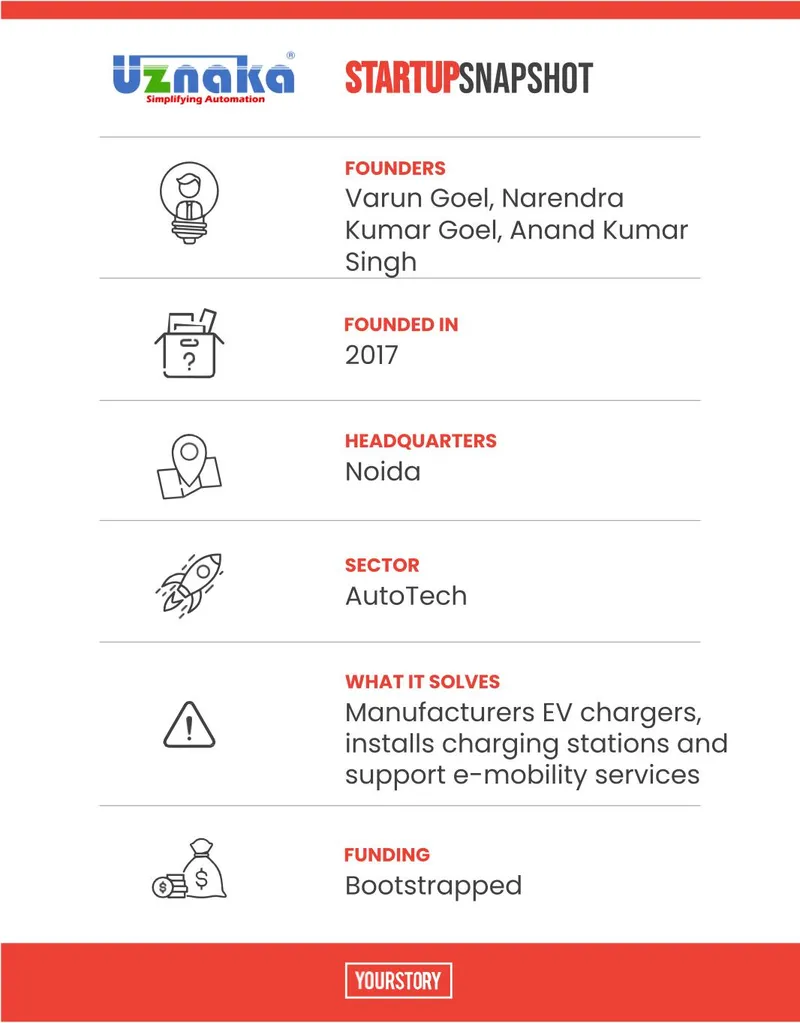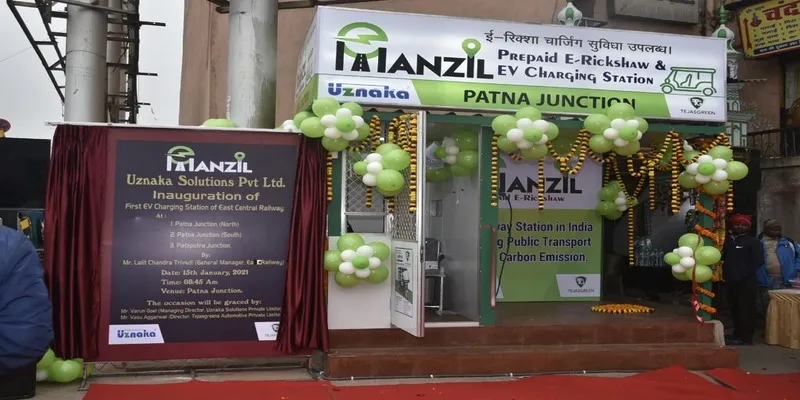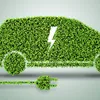[Tech50] How Noida-based startup Uznaka Solutions is building complete in-house EV chargers with proprietary tech
A YourStory Tech50 2021 startup, Uznaka Solutions manufactures EV charging equipment, sets up EV stations for clients and supports e-mobility services in Tier II and III cities.
There are very few entrepreneurs who truly take up the responsibility of the “Zero Defect Zero Effect” slogan coined by the Prime Minister as the essence of the Make in India initiative.
Varun Goel, Founder and CEO, Uznaka Solutions Pvt Ltd, a YourStory Tech50 2021 startup, refuses to compromise on the quality of his proprietary solution, placing long-term value creation above quick profits. This despite having to compete in an aggressively competitive market with players shelling out solutions at “bargain-basement prices”.
“Anyone can make a product using cheap Chinese components and play around with the price, but that would call for compromising on the quality. I am not willing to do that for quick money. We believe in quality over everything, ensure providing bespoke products to our customers, and aim to be contributing towards green and e-mobility," says Varun.
Noida-based manufactures Electric Vehicle (EV) charging equipment, sets up EV stations for clients and supports e-mobility services.

The genesis
It all started during the founder’s electronics and telecom engineering days as he started fiddling around with new technologies, solutions and concepts. In 2011, Varun designed a home automation system, whose potential use case was beyond appliances.
“I had been following the EV revolution taking place in Europe during that time and envisioned the same to set foot India, not immediate but maybe a few years down the line,” says Varun, who pursued his corporate career as a business strategist across MNCs (multinational companies) before going back to his “research laboratory” in 2017 to improvise on his home automation system and build EV chargers with the same technology at the base.
The biggest motivation for the founder was to come up with his own technology for EV charging and not follow the suit of “borrowing the design and product from global companies and rebrand it to sell to the Indian audience”.
“There are a very few Indian companies who have developed their own technology for EV chargers. You will never have the grip over a non-proprietary product, its spare parts, post services, or be able to incorporate user feedback and improvise to make it more local,” he says.

Varun was later joined by a mentor, Narendra Kumar Goel (who serves as the chairman at Uznaka Solutions) and long-time friend Anand Kumar Singh as a partner business strategist.
Building an Omnichannel model
Uznaka manufactures and sells mainly two types of EV charges -- Bharat AC 001 that can be used to charge two-wheelers and three-wheelers, and AC Type 2 for cars. Its clients include independent customers, e-rickshaw dealerships who typically sell e-rickshaws and provide charging stations at their stores, corporate offices, e-mobility service providers, original equipment manufacturers (OEMs), residential societies/apartments and commercial spaces. One can charge three vehicles simultaneously with the former while the latter comes with the option of single and double guns.
It sets up the complete charging station, starting from equipment installation to commissioning and training, at a one-time charge. It installed its first station at Kanpur in September 2019.
In order to give itself a “better exposure” in the market, the startup has also started E-Manzil, which provides an end-to-end service of public EV charging stations along with prepaid EV taxi and two-wheeler services, including e-rickshaws. It has a mixed fleet of owned and outsourced vehicles.
“E-Manzil is more focussed towards Tier II and Tier III cities, wherein we are first covering the state capitals. These areas are congested and have expensive taxi services. We will try to solve this gap with EV,” he says.
The company has set up two outlets each of E-Manzil in Patna and Bhopal and will soon expand to Lucknow, Allahabad, Kanpur, Varanasi, Moradabad and Agra. It has also tied up with Indian Railways for E-Manzil service and has set up facilities at various junctions across Bhopal, Lucknow and Patna. It operates on a build-operate-transfer (BOT) contract with the government and is holding back from participating in any tenders, for now.
Uznaka has an annual recurring revenue (ARR) of $50,000 and is currently valued at $6 million, according to the founder.
Quality over short gains
The unique selling point (USP) of Uznaka is its proprietary tech which allows it to have a strong grip on the product along with customisation options. It is proud to have “almost zero dependency” on third parties for spare parts, after sales service, and for any design upgrade.
“I can cut down the cost by 30 percent with Chinese components. But this would compromise on the quality, which we are not willing to do. This sometimes goes against us as our competitors are able to keep their costs and prices extremely low. However, our vision is more long term and aims to be the most preferred brand in the market as the industry matures,” says Varun.
Going forward, Uznaka plans to bring down the cost of its product with volumes and compete with mass manufacturing companies.

The ecosystem
The ecosystem for the development of chargers, charging stations, and other services is steadily being built in India by private players while OEMs work on the EVs. The overall market is diverse and divided into various offerings across the EV value chain, taken up by both big and small-sized players.
Companies such as Tata Power, Reliance, Fortum and Exicom are developing Electric Vehicle Supply Equipment (EVSE) or offering Charge Point Operator (CPO) services (which connect smart charging devices to E-mobility Service Providers) with end-to-end charging solutions. These companies have inked pacts with major public sector units (PSUs), OEMs, e-mobility service providers among others to offer these services, besides setting up their own private e-charging outlets. For instance, state-owned Hindustan Petroleum Corporation (HPCL) recently announced plans to set up 5,000 electric vehicle charging stations across their retail outlets over the next three years in collaboration with Convergence Energy Services Ltd (CESL), Tata Power and Magenta EV Systems. HPCL even launched its own charger in collaboration with Magenta EV Systems.
Varun opines that majority of these players are not manufacturers (except for the likes of Exicom and Delta Electronics), but “facilitators” in the market given their brand names and connect with the end-user.
“Big brands are sourcing these equipment from companies like us or abroad and assembling at their facilities. These brands are more into collaborating and integrating the ecosystem than manufacturing,” he says.
Uznaka faces close competition from Mumbai-based startup Magenta Power and other small to mid-sized players such as Zevpoint, Tirex, Statiq, Amplify Mobility, PlugNGo, ABB India, Mass Tech and so on.
Future plans
The startup is currently focussed on providing EV charging infrastructure across Tier II and Tier III cities and further build upon E-Manzil services. It plans to develop 150 E-Manzil outlets and an app for booking and billing purposes.
“We aim to build a holistic end-to-end offering, right from setting up a charging facility to battery swapping facility to last mile connectivity. We want to have Uznaka’s EV charging stations like fuel stations across the country,” says Varun, who is also in talks with OEMs for collaborations.
According to the Society of Manufacturers of Electric Vehicles (SMEV), there are 1,800 charging stations in India as on March 2021 for approximately 16,200 electric cars, including the fleet segment. India needs about 400,000 charging stations to meet the requirement for two million EVs that could potentially ply on its roads by 2026, says a recent Grant Thornton Bharat-FICCI report.
Uznaka’s charging facilities and last mile connectivity sets it on a promising path as the space doesn't have a clear winner yet. India’s EV ambition will require companies that provide electric vehicle charging stations as well as last mile mobility services through EVs, especially three-wheelers.
Edited by Ramarko Sengupta


![[Tech50] How Noida-based startup Uznaka Solutions is building complete in-house EV chargers with proprietary tech](https://images.yourstory.com/cs/2/628912e0d7f211eb8e8307e5b6451cf7/uznaka-1640752732223.jpg?mode=crop&crop=faces&ar=2%3A1&format=auto&w=1920&q=75)
![[Startup Bharat] This Vadodara-based startup is building charging infrastructures for electric vehicles](https://images.yourstory.com/cs/2/b094ec506da611eab285b7ee8106293d/imageonline-co-logoadded58-1628233647874.jpg?fm=png&auto=format&h=100&w=100&crop=entropy&fit=crop)





